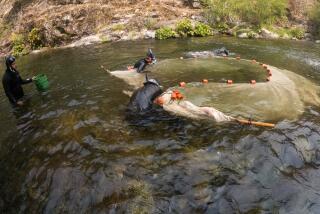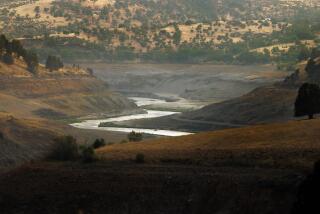Troubled Waters : Hard Times Surface in British Columbia Salmon Industry
- Share via
UCLUELET, Canada — It’s a bright spring morning in Ucluelet, and the breeze blowing along the cove has shirttails billowing and flags snapping--just the sort of day that usually finds the village’s fishermen down at the docks painting and repairing their boats in preparation for the summer salmon season.
But this year, the work pace is laggard and the mood is mournful, for these are the hardest of times for British Columbia’s historic salmon fishery.
The decline in salmon populations that over the last decade has damaged fishing industries in Northern California, Oregon and Washington has arrived in Canada. And to hear some tell it, the Canadian government’s response threatens to tear out the heart of small communities like this one.
That’s the view of hundreds of British Columbia’s commercial fishermen, who have vigorously protested new government rules that for the first time limit the areas where they can fish and that aim to eventually cut by 50% the size of the fleet.
Opponents of the regulations, including the provincial government and environmental groups, say the rules, in effect, pit small-boat owners against each other--and against large corporations--in a high-price bidding war for a dwindling number of salmon-catching licenses.
The inevitable losers, critics say, will be poorer fishing families in coastal villages, leaving the industry concentrated in the hands of a few companies and wealthy individuals headquartered in Vancouver.
“Basically, what you have is a situation where fishermen cannibalize each other,” said Jeff Edwards, a third-generation Ucluelet salmon trawler fisherman.
Not surprisingly, officials in the Canadian Department of Fisheries and Oceans, where the new rules originate, disagree.
“There are too many boats chasing too few fish,” said Paul Sprout, director of operations for the department’s Pacific region. The government plan represents an orderly, humane downsizing of an unprofitable industry, he said, and the result will be a smaller, more manageable, more economically viable fleet, with built-in protections for family fishermen.
Though the new licensing program is just beginning, Sprout said that so far “there’s simply no evidence” of small-boat owners being pushed aside.
Meanwhile, fishermen in Alaska and the Pacific Northwest wait to see whether the controversy will affect negotiations on a treaty governing division of the Pacific salmon catch between Canada and the United States.
*
Regardless of their current argument, fishermen and the government agree that something had to be done to reverse the Pacific salmon decline. Overfishing, environmental damage to rivers where the fish spawn and an El Nino warm water current have sent populations crashing.
Last year’s commercial catch was the lowest in 20 years. The big king salmon, one of five Pacific salmon types to spring from British Columbia’s rivers, is so near extinction that it has been placed off-limits not only to commercial fishermen like Edwards, who supply supermarkets and restaurants, but also to sport fishermen, some of whom journey thousands of miles for a chance to hook a king. Recreational anglers this year must release the king salmon they catch.
Fisheries officials believe the long-term solution is to gradually halve the 4,400-boat salmon fleet, partly by paying some fishermen to “retire” their licenses and partly by changing the rules for fishing.
For years, a salmon fishing license gave boats freedom to range the entire Canadian west coast in pursuit of the fish, which follow an ocean migration north into the Gulf of Alaska before returning to spawn and die in the rivers where they were born.
Now, however, the fishing grounds have been divided into zones. Each license is good for one zone and one type of fishing gear. Edwards, for example, picked the waters west of Vancouver Island for his 50-year-old lure-and-line trawler.
There is no restriction on the number of licenses purchased for each boat, however. So anyone who can afford to buy licenses from other fishermen can fish all along the coast. This has created a seller’s market, with license prices reported from $29,400 to $100,000 and more, depending on the boat size.
“With current economic conditions, small fishermen can’t conceivably put up the money to buy another license,” Edwards said. “ . . . The British Columbia salmon fleet is going to be one of the last resource industries concentrated into corporate ownership. . . .
“I always have tried to diversify to protect myself from the bad years in the salmon fishery, but lately there have been more bad years than good years,” he said, gazing out the back window of his home as his coffee went cold. “I’ve been mortgaging my house and assets to keep going.”
*
While Edwards believes the salmon will come back, he’s not sure his 19-year-old son, Cameron, has a future in the family business: “As a career, he probably can’t afford to get into it. He won’t be able to buy a license.”
Similar misgivings are cropping up all over Ucluelet, population 1,700, according to Mayor Bill Irving. “We’ve been centered around fishing for generations,” said Irving, who figures the industry accounts for almost a third of the local economy.
Restrictions on the commercial fleet here may carry implications for U.S. fishermen as well. Salmon born in the rivers of the Pacific Northwest and Alaska join Canadian-spawned fish in the Pacific. In the past, the two countries have divided the ocean catch by treaty, but renewal talks are stalled over Canadian claims that Alaska fishermen grab more than their fair share. And the tough new licensing plan has created political pressure for Canada to demand more in the negotiations.
Meanwhile, some environmental groups feel the government should do more. Greenpeace, for example, has called for a moratorium on salmon fishing until populations bounce back. “It’s an economic hardship, I grant you, but it will be a much greater economic hardship if an industry that is purportedly a big moneymaker . . . is closed permanently,” said Catherine Stewart, who heads Greenpeace’s fishing campaign. “We have to take a long-range view here. We can’t stand by and watch the stocks eradicated.”
(BEGIN TEXT OF INFOBOX / INFOGRAPHIC)
Upstream Battle
The declining salmon population on the West Coast threatens the livelihood of thousands who fish commercially, including those in British Columbia, where controversy rages. The annual British Columbia salmon catch, in millions of fish:
1995: 20.7
Source: British Columbia Department of Fisheries and Oceans
More to Read
Sign up for Essential California
The most important California stories and recommendations in your inbox every morning.
You may occasionally receive promotional content from the Los Angeles Times.










